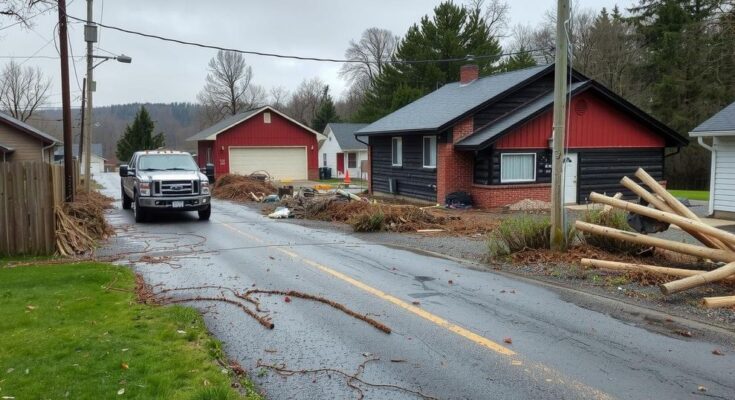Rural counties in Pennsylvania are recovering from Tropical Storm Debby, which triggered significant flooding and overwhelmed emergency services. Following a disaster declaration by Governor Josh Shapiro, FEMA has allocated over $12 million in aid. Despite this assistance, local officials are pushing for long-term solutions to mitigate future storm damage, as the community continues to face recovery challenges.
Rural counties in Pennsylvania are in the midst of recovery efforts following the devastating impacts of Tropical Storm Debby, which struck in early August. The storm led to significant flooding, particularly in Tioga County, where emergency dispatchers reported an overwhelming number of calls for assistance. With more than 500 help requests in a single day and 311 assistance dispatches, the storm’s rapid onset caught many residents off guard. Unfortunately, the storm resulted in one tragic fatality in Tioga County, further underscoring the severity of the situation.
In response to the disaster, Pennsylvania Governor Josh Shapiro declared a disaster emergency across 28 counties. The Federal Emergency Management Agency (FEMA) has since approved over $12 million in relief funding aimed at assisting affected residents in Tioga, Lycoming, Potter, and Union Counties. Preliminary reports indicate that claims have primarily been for heating system repairs, with an average aid amounting to approximately $7,969 for eligible applicants.
Despite federal aid forming a crucial part of recovery, local officials, including 911 Director Lisa Rice of Tioga County, are advocating for long-term disaster mitigation strategies to prevent such extensive damage in future storms. Rice noted that while flooding is not uncommon in the region, the rapid escalation of water levels was unprecedented, disrupting the lives of many residents who found themselves unable to leave their homes.
Residents like Terry VanDusen, who suffered significant property losses from the storm, expressed gratitude for federal assistance but highlighted that it barely covers the considerable costs associated with recovery. VanDusen reported losses totaling approximately $75,000, despite receiving just around $6,000 in aid. The Westfield Child Development Center, which also faced damages, struggled without flood insurance and had to rely on community volunteers for repairs.
Amid ongoing recovery, local officials have raised concerns over debris and gravel that washed into waterways during the storm. The Tioga County Board of Commissioners is seeking assistance from federal and state agencies to fund environmental cleanup efforts, particularly in critical areas such as the Cowanesque River. Without these efforts to manage the debris, officials fear the potential for recurrent flooding that could jeopardize recovery initiatives.
In summation, the aftermath of Tropical Storm Debby has prompted significant federal relief efforts and local advocacy for improved disaster preparedness in Pennsylvania’s rural counties. While recovery is underway, county officials remain vigilant, hoping to learn from this experience in anticipation of future storms.
Tropical Storm Debby, which occurred in August, significantly impacted rural areas in Pennsylvania, particularly Tioga County, leading to widespread flooding and emergency situations. The storm overwhelmed local emergency services, resulting in a high volume of distress calls and property damage. While federal assistance has begun to facilitate recovery, municipal leaders are now focused on preventing similar occurrences in the future by seeking enhanced support for mitigation strategies and infrastructure improvements.
In conclusion, as rural Pennsylvania grapples with the recovery from Tropical Storm Debby, the necessity for effective disaster management has become increasingly apparent. The current federal funds provide essential short-term relief, yet local authorities stress the importance of developing long-term solutions to safeguard communities against similar events in the future. By addressing both immediate needs and future vulnerabilities, local agencies aim to create a more resilient environment for residents in the wake of climate-related challenges.
Original Source: www.inquirer.com




